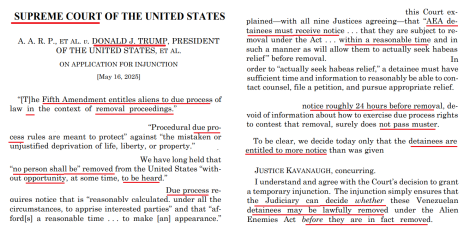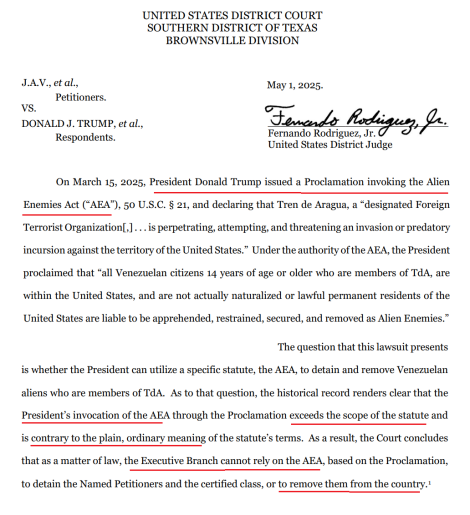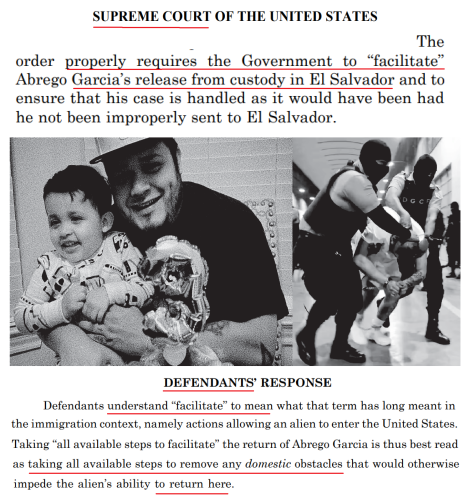The Foundation of American Rule of Law

Brett Kavanaugh, Trump’s second Supreme Court appointee, said a week before being confirmed in 2018:
“Due process is the foundation of the American rule of law… We live in a country devoted to due process and the rule of law. That means taking allegations seriously. But if the mere allegation, the mere assertion of an allegation … is enough to destroy a person’s life … we will have abandoned the basic principles of fairness and due process that define our legal system and our country.”
The Fifth Amendment established due process in 1791: “No person shall be held to answer for a capital, or otherwise infamous crime, unless on a presentment or indictment of a Grand Jury … nor be deprived of life, liberty, or property, without due process of law…”
The Fourteenth Amendment further enshrined it in 1868: “nor shall any State deprive any person of life, liberty, or property, without due process of law…”
Yet the Trump administration has repeatedly violated the Constitution’s twice-stated due process requirement through illegal deportations, most prominently of Abrego Garcia who, the administration admitted on April 1, was deported through an “administrative error.”
As Justice Sotomayor later noted, Garcia is “a husband and father without a criminal record.” His wife, son, and brother are U.S. citizens. He has lived in Maryland for thirteen years, after committing the misdemeanor of improper entry as a teenager to escape threats of violence in El Salvador. In 2019, a judge barred the government from returning him because it would risk his “life or freedom.”
Six years ago, an anonymous police source asserted the allegation that Garcia is a gang member.
The Trump administration has attempted to justify its deportations through President Trump’s March 15 executive order, “Invocation of the Alien Enemies Act Regarding the Invasion of The United States by Tren De Araguaz.” All courts have rejected the unprecedented use of the Act to deny constitutionally mandated due process.
On April 6, Judge Xinis of the District Court of Maryland wrote: “because equity and justice demand it, the Court grants the narrowest, and daresay only, relief warranted: to order the Defendants return Abrego Garcia to the United States.”
On April 7, the Fourth Circuit Court of Appeals wrote jointly: “The United States Government has no legal authority to snatch a person who is lawfully present in the United States off the street and remove him from this country without due process. The Government’s contention otherwise, and its argument that the federal courts are powerless to intervene, is unconscionable.”
On April 16, Judge Boasberg of the District Court of DC wrote: “The Constitution does not tolerate willful disobedience of judicial orders – especially by officials of a coordinate branch, who have sworn an oath to uphold it. To permit such officials to freely annul the judgments of the courts … would make a solemn mockery of the Constitution itself.”
On April 17, Judge Wilkinson of the Fourth Circuit Court of Appeals wrote: “The government is asserting a right to stash away residents of this country in foreign prisons without the semblance of due process that is the foundation of our constitutional order. This should be shocking not only to judges, but to the intuitive sense of liberty that Americans far removed from courthouses still hold dear.”
On April 18, the Supreme Court ruled 7-2: “The Government is directed not to remove any member of the putative class of detainees from the United States until further order of this Court.”
On May 1, Judge Rodriguez of the District Court of Southern Texas ruled: “the President’s invocation of the AEA … exceeds the scope of the statute and is contrary to the plain, ordinary meaning of the statute’s terms… the Executive Branch cannot rely on the AEA … to detain the Named Petitioners and the certified class, or to remove them from the country.” Judge Rodriguez was appointed by Trump in 2017.
On May 9, Judge Sessions of the District Court of Vermont ordered Rumeysa Ozturk released: “Her continued detention potentially chills the speech of the millions and millions of individuals in this country who are not citizens. Any one of them may now avoid exercising their First Amendment rights for fear of being whisked away to a detention centre.”
On May 13, Judge Haines of the District Court of Western Pennsylvania wrote: “the notice that the Executive Branch is currently extending to individuals subject to removal under AEA is deficient under our Constitution … in light of … the Fifth Amendment.” Judge Haines was appointed by Trump in 2019.
And most recently, on May 16, the Supreme Court wrote again: “‘[T]he Fifth Amendment entitles aliens to due process of law in the context of removal proceedings.’ … We have long held that ‘no person shall be’ removed from the United States ‘without opportunity, at some time, to be heard.’ … In order to ‘actually seek habeas relief,’ a detainee must have sufficient time and information … notice roughly 24 hours before removal, devoid of information about how to exercise due process rights to contest that removal, surely does not pass muster.”
Justice Kavanaugh added: “The injunction simply ensures that the Judiciary can decide whether these Venezuelan detainees may be lawfully removed under the Alien Enemies Act before they are in fact removed.”
Still, there are some who reject due process. Republican Rep. Lauren Boebert claims: “If someone is in our country illegally, I don’t believe that there is much due process that is afforded to them. They do not have American citizens’ rights.”
Boebert is factually wrong. Justice Scalia wrote in the 1993 Supreme Court decision Reno v. Flores: “it is well established that the Fifth Amendment entitles aliens to due process of law in deportation proceedings.”
When asked, “Is everyone on U.S. soil, citizens and non-citizens, entitled to due process?” Secretary of State Rubio answered, “Yes, of course.”
Yet when President Trump was asked if he agreed, he answered, “I don’t know. I’m not, I’m not a lawyer. I don’t know.”
Despite not being a lawyer, Trump attacked the Supreme Court’s most recent 7-2 ruling against him, complaining that in order to get alleged criminals “out of our Country, we have to go through a long and extended PROCESS.”
Trump’s senior director for counterterrorism, Sebastian Gorka, suggests that anyone demanding due process is “aiding and abetting criminals and terrorists” which “is a crime.”
He added: “It’s not left and right, It’s not even Republican or Democrat. There’s one line that divides us: Do you love America or do you hate America? It’s really quite that simple.”
Gorka is inadvertently correct. Trump-appointed Justice Kavanaugh said seven years ago: due process defines America. Only those who hate our country disregard it.
.
.













Chris Gavaler's Blog
- Chris Gavaler's profile
- 3 followers



